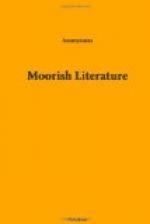Prince Mouley-Abd-Er-Rahman sent at once against them his son Sidi-Mahomet with the khalifah and 6,000 horsemen. The people of Tiznit were informed of the approach of the army under the Sultan’s son, and that the advancing guard was near. The soldiers arrived in the middle of the country of the Achtouks and camped in the city of Tebouhonaikt near the river Alras. There was a day’s march between them and Tiznit. The inhabitants, frightened, sent deputies to the other districts, saying:
“Come and help us, for the Sultan’s son has come and ordered us to build him a fort in the space of one month or he will fall upon us, cut a passage, and destroy our city.” The tribes around Tiznit assembled and marched against the royal army. The Sultan’s son stayed twenty-two days at Tebouhonaikt, then he crossed the river Alras and marched against the rebels. He surrounded Tiznit on all sides. The inhabitants made a sortie, engaged in battle, and fought till the morning star. At the fall of day the battle recommenced. The royal army was defeated and driven across the river Alras. The son of the Sultan killed eight rebels and thirty-five horses, but many of his soldiers fell. He retreated to Morocco.
VII
Information about the country of Taragoust: This is a unique district situated near the source of the Ourd-Sous. It is distant from Taroundant about a day and a half’s march. When a young man becomes of age his father buys him a gun and a sabre. The market is in the middle of the country. But no man goes there without his weapons. The sheiks judge each one in the market for four months in the year in turn and during their period of office. They decided who was guilty and demanded price of blood for those killed in the market. One of them said:
“I will give nothing. Find the murderer. He will give you the price of blood.”
The sheik replied: “Pay attention. Give us part of your goods.”
“I will give you nothing,” he answered.
In this way they quarrelled, until they began fighting with guns. Each tried to steal the other’s horses and oxen in the night and kill the owner. They kept acting this way toward each other until Ben-Nacer came to examine the villages where so many crimes were committed, and he reestablished peace and order.
VIII
Concerning guns and sabres: They were all brought into the city of Adjadir in the government of Sidi Mahomet-ben-Abd-Alla. They introduced guns, poniards, sabres, English powder, and everything one can mention from the country of the Christians. Sidi Mahomet-ben-Abd-Allah sent there his khalifah, called Ettaleb Calih. He busied himself during his administration in amassing a great fortune. The guns imported into the provinces were called merchandise of the taleb Calih. This officer revolted against the Sultan, sent him no more money, and consulted him no longer in the administration of affairs. When the prince ordered him to do such and such a thing with the Christians, Mussulmans, or others, he replied:




